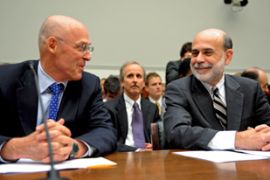Bush meets presidential candidates
US president urges congress to approve bail-out but critics want White House explanation.

A day earlier Bush said that the US is in the middle of a serious financial crisis that could push the economy into a long-term recession if the government does not act.
In a televised address on Wednesday aimed at persuading the public to support a $700bn financial bail-out being negotiated with congress, George Bush reiterated that urgent action was needed to bolster the markets.
Explanation wanted
But critics said Bush had to explain why the financial mess happened on his watch.
“It is time for him to explain why his administration sat on its hands for months and only now has come to realise the need for immediate and unprecedented government action,” Harry Reid, the Democratic senate majority leader, said before Bush’s address.
Bush said his “natural instinct” was to oppose government intervention in the financial sector, but the financial turmoil called for a different approach.
“I believe companies that make bad decisions should be allowed to go out of business,” Bush said. “Under normal circumstances, I would have followed this course. But these are not normal circumstances.”
He cited a market that was not functioning properly, a widespread loss of confidence and major financial sectors at risk of shutting down.
More financial distress could lead more banks to fail, the stock market to drop further, businesses to close, job losses and home values to drop, Bush said.
“And, ultimately, our country could experience a long and painful recession,” Bush said. “Fellow citizens, we must not let this happen.”
‘Really bad stuff’
The Bush administration and congress have been trying to hammer out an agreement on a plan that would allow the government to step in and buy up bad mortgage-related debts from financial institutions, including US subsidiaries of foreign banks, to try to stem the financial storm.
But the plan has drawn criticism, even from the president’s supporters.
“I love and support the president, but I am not with him on this,” Jack Burkman, a Republican strategist, told Al Jazeera.
“Everybody knows recessions are important. You need them. They’re part of the business cycle. Congress should never be in the business of trying to sweep things away … and I like the way congress is coming together in a bipartisan way to defeat this nonsense,” he said.
“This is really bad stuff – I don’t think the US is in the shape that the treasury secretary describes.”
Just before his speech, Bush invited Barack Obama and John McCain, the two candidates vying to succeed him, along with the leaders of the House of Representatives and the senate, to the White House on Thursday to try to get support for the bail-out plan.
Uncertainty
The bail-out package unveiled late last week triggered a temporary rally in global stocks but concerns over if and when congress would approve the plan and uncertainty about its final form quickly eclipsed that optimism.
The unprecedented bail-out has come under heavy fire from legislators from both parties and Americans sceptical about providing a lifeline to Wall Street when homeowners and ordinary Americans are suffering.
The uncertainty continued to weigh on global markets, with US stocks closing lower on Wednesday and Asian stocks following suit in early trade on Thursday.
The Dow Jones industrial average closed 0.3 per cent lower, while Japan’s Nikkei average fell 0.9 per cent on Thursday and other Asian stocks mainly fell.
Gold, considered a safe investment in uncertain times, gained, rising towards Tuesday’s seven-week high while crude oil futures held steady near $105.70 per barrel.